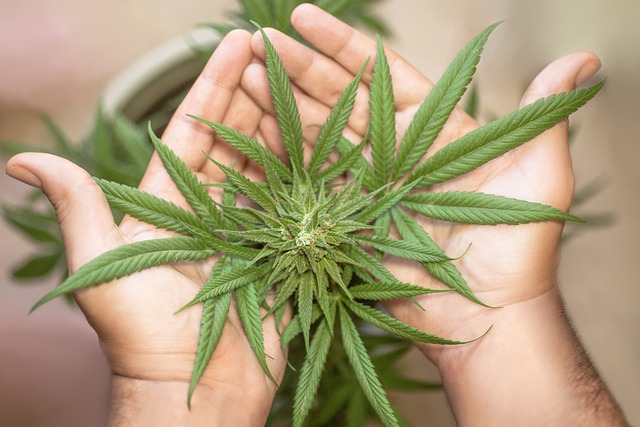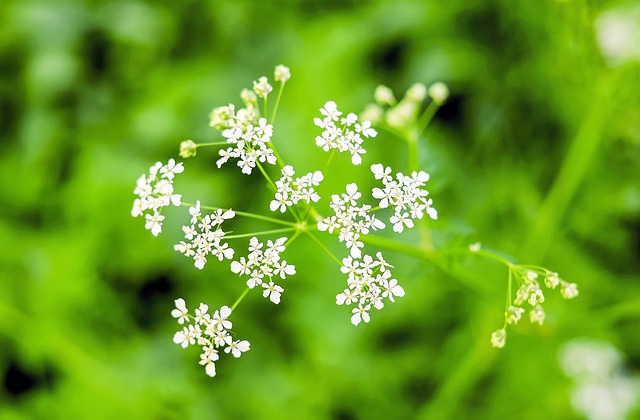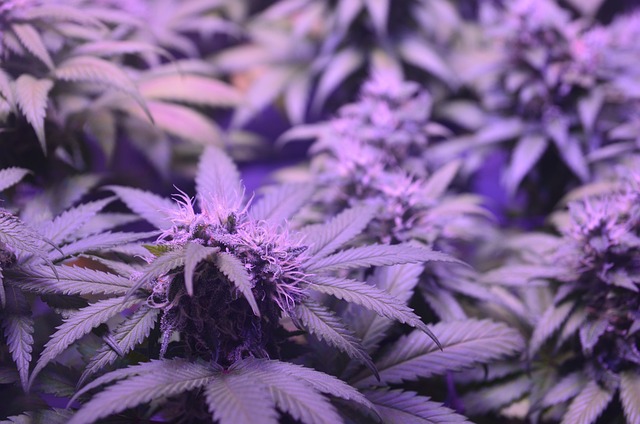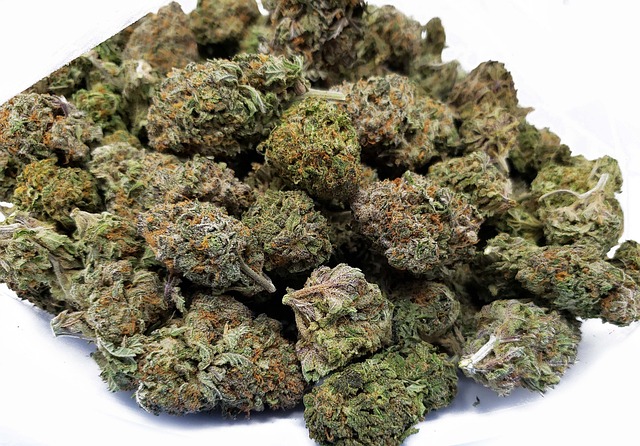2018 Farm Bill-compliant THCA, a non-psychoactive cannabinoid with potential health benefits, is legally recognized in Mississippi if it contains less than 0.3% THC on a dry weight basis. The legality of THCA flower is defined within the state's medical marijuana program, established by the Mississippi Medical Marijuana Act. For legal use, THCA products must adhere to regulatory standards for potency and labeling, and can only be obtained through a doctor's recommendation for qualifying conditions and from state-licensed dispensaries. As of the latest updates, THCA flower is available under this medical program in Mississippi. Users are advised to stay informed on legislative changes and should consult with healthcare professionals about potential side effects, such as gastrointestinal issues or mood alterations, and interactions with other medications. The use of THCA in Mississippi is subject to a careful approach due to its potential effects and the legal requirements that govern it. Research suggests that THCA interacts with the human endocannabinoid system (ECS), affecting bodily processes like appetite, sleep, and immune response, without inducing psychoactive effects. This interaction underscores the interest in THCA for wellness purposes within Mississippi's legal boundaries.
Exploring the complexities of THCA flower, an emerging presence in the cannabis landscape, this article delves into its legal status, therapeutic potential, and side effects. With a focus on Mississippi, where THCA’s legal standing is clarified, readers will gain insights into the unique properties of tetrahydrocannabinolic acid, its interaction with the endocannabinoid system, and how it differs from other cannabinoids like THC and CBD. We will examine the science behind its side effects, discuss dosage and safety considerations, and provide guidance on sourcing safe and legal THCA flower in the state. This comprehensive overview aims to demystify user experiences, address common misconceptions, and offer practical advice for both newcomers and seasoned users. Join us as we navigate the intricacies of THCA flower, its effects, and its place within the ever-evolving legal landscape of Mississippi.
- THCA Flower: An Overview of Tetrahydrocannabinolic Acid
- The Legal Status of THCA Flower in Mississippi
- Potential Side Effects of THCA Flower Consumption
- Understanding THCA's Interaction with the Endocannabinoid System
THCA Flower: An Overview of Tetrahydrocannabinolic Acid

THCA, or tetrahydrocannabinolic acid, is a non-psychoactive cannabinoid found naturally in the cannabis plant. It is recognized for its potential therapeutic properties and has garnered attention as a subject of scientific research. In its raw form, THCA does not exhibit the psychoactive effects associated with its decarboxylated form, THC (tetrahydrocannabinol). As such, products containing THCA flower are often pursued for their wellness benefits without the intoxicating aspects of THC.
In the context of legal considerations, the status of THCA flower varies by state within the United States. For instance, in Mississippi, THCA is considered a legal cannabinoid as long as it is derived from hemp compliant with the 2018 Farm Bill and contains less than 0.3% THC on a dry weight basis. This distinction is crucial for consumers and producers alike, as Mississippi’s laws reflect a growing trend towards the regulation and legalization of certain cannabinoids for commercial and medicinal use. Users interested in exploring the potential benefits of THCA flower should first ensure that their acquisition and use comply with state and federal regulations to avoid any legal complications.
The Legal Status of THCA Flower in Mississippi

In recent times, the legal status of THCA flower, a non-psychoactive compound found in cannabis plants, has been a topic of interest and debate across various states in the United States. In Mississippi, the legislative landscape regarding THCA flower is shaped by the state’s medical marijuana program. The Mississippi Medical Marijuana Act, which was passed in November 2020, legalized the use of cannabis for medical purposes under a physician’s recommendation for qualifying conditions. Within this framework, products that contain THCA are technically permissible if they are part of a doctor-recommended treatment plan and dispensed through state-licensed facilities. It’s crucial for consumers to adhere to the specific regulations set forth by the Mississippi Department of Health, which oversee the program and ensure compliance with state laws.
The legal parameters for THCA flower in Mississippi are subject to change as the state’s medical marijuana program evolves. As of the latest updates, THCA flower is allowable under the state’s medical cannabis program, provided it meets the regulatory criteria for potency and labeling. Users should be aware that while THCA itself does not produce psychoactive effects, it is a precursor to THC and can still contribute to the overall effects of cannabis. Therefore, patients must have a valid medical marijuana card and purchase THCA flower from licensed dispensaries within the state to remain compliant with Mississippi’s laws. It’s important for individuals interested in using THCA products to stay informed about any legislative changes that may affect their access and use.
Potential Side Effects of THCA Flower Consumption

THCA, or tetrahydrocannabinolic acid, is a non-psychoactive cannabinoid found in the cannabis plant that is precursor to THC, the psychoactive compound most are familiar with. As legislation evolves, such as THCA being legal in Mississippi under certain conditions, consumers are increasingly exploring its potential benefits and effects. While research on THCA is still emerging, some users report different side effects upon consumption of THCA flower. These can include mild psychoactive effects, which are generally less intense than those caused by THC, as well as potential gastrointestinal issues like indigestion or nausea in some individuals. It’s also worth mentioning that THCA may interact with certain medications, so individuals taking prescribed drugs should consult a healthcare professional before use. Additionally, consumers might experience dry mouth or eyes, dizziness, or altered mood, which are common side effects associated with cannabinoid consumption. As with any substance, it is crucial for users to start with small doses to gauge individual reactions and to be aware of the legal boundaries surrounding its use in their jurisdiction. Understanding the nuances of THCA’s effects, including its side effects, is essential for informed decision-making within the legal framework established by states like Mississippi.
Understanding THCA's Interaction with the Endocannabinoid System

delta-9-tetrahydrocannabinolic acid (THCA) is a non-psychoactive cannabinoid found in the Cannabis sativa plant, which has garnered attention for its potential therapeutic properties. THCA becomes psychoactive THC when heated above a certain temperature, but it interacts with the body in its own right through the endocannabinoid system (ECS). The ECS is a complex cell-signaling system identified in the early 1990s, which plays a crucial role in regulating a range of physiological processes including mood, memory, pain sensation, and immune system responses.
In Mississippi, where THCA’s legal status is being redefined, understanding how this cannabinoid interacts with the ECS is particularly relevant. The ECS comprises three key components: endocannabinoids, receptors, and enzymes. Endocannabinoids are naturally occurring molecules that bind to cannabinoid receptors in the body, which are found throughout various organs and tissues. THCA can interact with both CB1 and CB2 receptors, influencing their activity without directly inducing a high. This interaction may influence a host of bodily functions, from appetite and digestion to sleep and immune system responses, making it a subject of interest for both researchers and those seeking alternative health solutions within the legal parameters set forth by states like Mississippi. As research continues, the precise mechanisms through which THCA affects human health are becoming clearer, offering new insights into its potential role in maintaining balance, or homeostasis, within the body.
In conclusion, the exploration into the nature of THCA flower has shed light on its potential within the legal landscape of Mississippi, where it holds a unique position as THCA legal in Mississippi is subject to evolving laws and regulations. While THCA is non-psychoactive, it is metabolized into THC, which may lead to certain side effects upon consumption. It is crucial for individuals to understand how THCA interacts with the endocannabinoid system, particularly regarding its therapeutic properties and potential impacts on health. As research continues to evolve, so too will the understanding of THCA’s effects, ensuring informed decision-making in its use. Users are advised to consult healthcare professionals and adhere to local laws when considering THCA flower as part of their wellness regimen.
